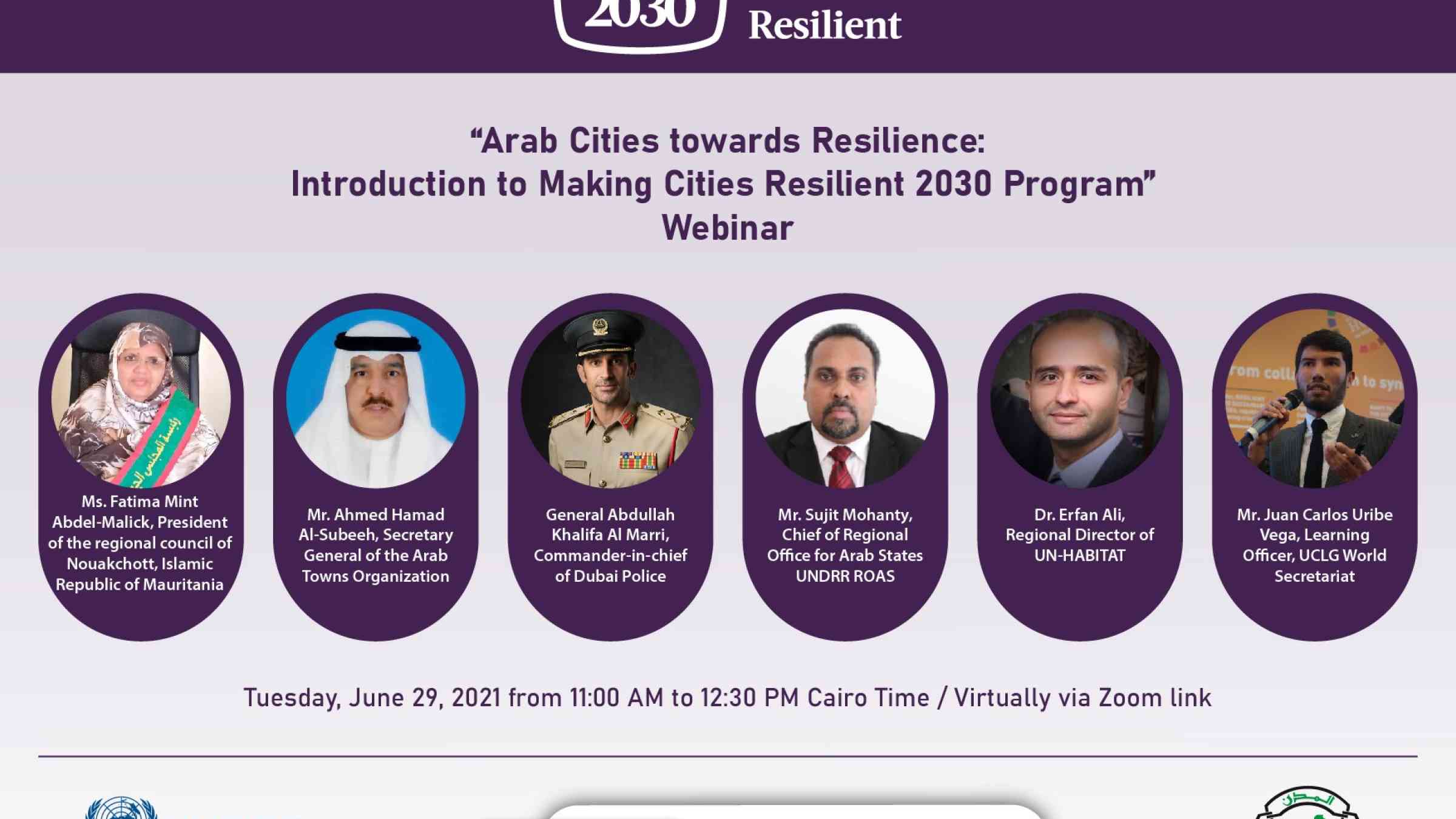“Arab Cities towards Resilience: Introduction to Making Cities Resilient 2030 Program” Webinar

Based on a common vision and continuous effort to raise awareness and develop capacities on building resilience to disasters and achieve sustainable development in the Arab cities, the UNDRR Regional Office for the Arab States (ROAS), in partnership with the Arab Town Organizations (ATO), is organizing a webinar titled “Arab Cities towards Resilience: Introduction to Making Cities Resilient 2030 Program”. This joint webinar represents an excellent platform to empower the local governments and support their efforts to reduce risk and build resilience through the Making Cities Resilient 2030 (MCR 2030) Programme.
Background
MCR2030 is built upon the success of the previous decade of advocacy work under the Making Cities Resilient (MCR) Campaign, which was launched in 2010 and concluded at the end of 2020. The MCR Campaign, led by the United Nations Office for Disaster Risk Reduction (UNDRR) and delivered with partners, has achieved considerable success in promoting urban disaster resilience through local government authorities. It has advocated the need to reduce risk and develop urban resilience through analysis and action plans, raised cities’ awareness and understanding of systemic issues and their connectedness, and through this process built local capacity, generated awareness and interest, and created or strengthened stakeholder partnerships.
Moving beyond 2020 into a Decade of Action, cities are in need of more guidance and capacity development in many technical areas ranging from awareness and strategic planning to effective implementation of risk-informed urban development plans. Campaign partners and cities have asked for a follow-up program that moves beyond advocacy and awareness-raising to support cities to assess their resilience status, accelerate the development of local DRR strategies (in response to Target e of the Sendai Framework), integrate DRR with climate change adaption and sustainable development, and then implement the risk-informed strategy with support from local, regional and global partners.
The Making Cities Resilient 2030 (MCR2030) is a unique cross-stakeholder initiative for improving local resilience through advocacy, sharing knowledge and experiences, establishing mutually reinforcing city-to-city learning networks, injecting technical expertise, connecting multiple layers of government, and building partnerships. Through delivering a clear resilience roadmap MCR2030 supports cities on their journey to reduce risk and build resilience.
Objective
The webinar aims to present the Making Cities Resilient 2030 (MCR2030) program benefits, and the different strategic objectives and stages of the resilient roadmap according to the MCR2030 Programme.
Target Audience
The webinar targets the local governments/cities in the Arab region to pave the road for a city-to-city exchange among local governments for peer-to-peer learning, and for information sharing on best practices in achieving cities resilience and in implementing disaster risk reduction strategies, building on the lessons learned of the previous MCR campaign implementation 2010-2020.
Organizers
The UNDRR Regional Office for the Arab States (ROAS): was established in 2007 to support the Arab States and communities build their resilience to disasters. ROAS partners for disaster risk reduction (DRR) with key regional intergovernmental organizations including the League of the Arab States and its technical regional organizations.
The Arab Town Organization (ATO): is an Arab non-political, non-religious, and non-governmental regional organization specialized in the affairs of towns and municipalities. ATO is a member of the Regional Coordination Committee of the MCR 2030 Programme.
Panelists:
- H.E. Ahmed Hamad Al-Subeeh, Secretary-General of the Arab Towns Organization
- Mr. Sujit Mohanty, Chief of Regional Office for Arab States UNDRR ROAS
- Lieutenant General Abdullah Khalifa Al Marri, Commander-in-chief of Dubai Police
- Dr. Erfan Ali, Regional Director of UN-HABITAT
- Ms. Fatima Mint Abdel-Malick, President of the regional council of Nouakchott, Islamic Republic of Mauritania
- Mr. Juan Carlos Uribe Vega, Learning Officer, UCLG World Secretariat
Duration: 90 minutes
Language: English, Arabic, and French with simultaneous interpretation available.

